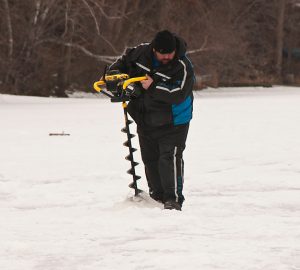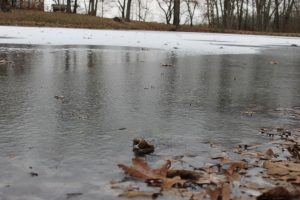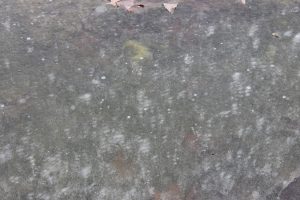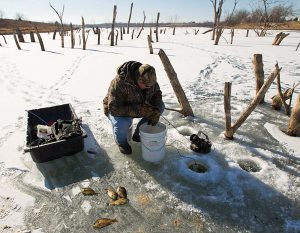On Frozen Pond

Years ago, when I had more strength than common sense, I’d come out to our pond during the deep winter months carrying a chainsaw and a sledgehammer. Several times each week, you could see me pounding away during the low light of dawn, attempting to create holes in the ice in order to save the fish from their desperate plight below. Then one morning I threw my back out and the fish didn’t seem so important to me. I wasn’t able to come outside for several weeks, and you know what? I didn’t seem to be so important to the fish either.  (OnFrozenPondContinued)
(OnFrozenPondContinued)
That spring I had just as many catfish, bass, carp and blue gill as ever. No huge fishkill floating along the freshly thawed surface. I thought to myself, what must those neighbors have thought who stared at me thru their living room window, the farmer in the truck that passed by every day and the folks on their way to work? “What is that guy doing? What a moron.”
A few conversations with those people and a little help on the internet, and I realized that there was a whole lot that I didn’t need to do, and just a little bit of what I did need to do.
Ponds have been freezing over since before God even made water, and we weren’t around to break up the ice. The fish must have done ok since they’re still here for me to catch and eat.
Here is what I discovered and I’ll begin by sharing some basic facts and information-
Fish are by their nature cold blooded, meaning their body temperature is regulated by the temperature of the surrounding water.
Fish survive a frozen pond during the winter months by regulating their metabolism, which results in a decrease in the amount of food they eat and oxygen they breathe.
A fish recognizes the change in seasons, even from underwater. They, like squirrels for example, with store up on food in preparation for winter. They can’t survive beneath a frozen body of water indefinitely, but generally they can make it for up to a few months.
Once the surface of water becomes solid, oxygen can and will continue to exist below. They will not suffocate because of a hard freeze. 
Many fresh water fish, from Goldfish to Trout, experience what is called Torpor. This is similar to hibernation but for a shorter period. During this period, fish will experience a lower body temperature, lower metabolism, reaction times, breathing and other basic body functions.
It is common for fish to find and park in the warmest spots of your pond, which during January will be at the bottom. During the summer the warmest areas will be near the surface. A shad might be skipping across the water during the summer but you won’t see that once the weather turns.
Breaking up the ice may allow some oxygen into the water, but at such an small amount it is doubtfully even measurable.
 Now there may be a legitimate reason you may want to break open an area in the ice. Mississippi isn’t Minnesota and every situation is different. Some ponds that have a lot of algae or sediment buildup may expel excessive amounts of noxious gas like ammonia, and that will continue year round. So yes, in that case, drilling a hole releasing that buildup can alleviate the risk to your fish. Or you just feel the need to sit in a rusty lawn chair with a chilled beer and drop a hook down that hole to see whats for supper. That would seem to be the most common practice.
Now there may be a legitimate reason you may want to break open an area in the ice. Mississippi isn’t Minnesota and every situation is different. Some ponds that have a lot of algae or sediment buildup may expel excessive amounts of noxious gas like ammonia, and that will continue year round. So yes, in that case, drilling a hole releasing that buildup can alleviate the risk to your fish. Or you just feel the need to sit in a rusty lawn chair with a chilled beer and drop a hook down that hole to see whats for supper. That would seem to be the most common practice.
This article is intended to give you a little more understanding of what is occurring below the surface of a frozen pond and what, if anything needs to be done above it. It isn’t exhaustive but reflects my experience and knowledge gained thru error and ignorance.
For More Content About Maintaining a Healthy Pond
<script src=”//z-na.amazon-adsystem.com/widgets/onejs?MarketPlace=US&adInstanceId=d262aa32-4fbf-4d65-9dec-ec5109573d33&storeId=americanou00e-20″></script>















